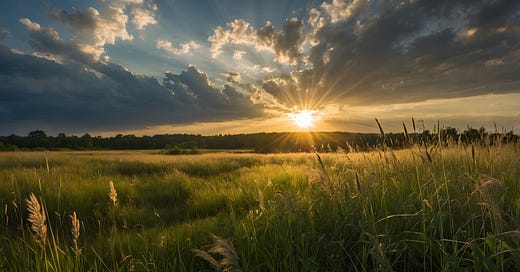Sunday Brain Mix: Seasonality in Genes, Locked in Stress, Complex Decision-Making in the Brain, What Humans Can do Better than AI
Today I give you nice mix from seasonality and how different people respond to this, new insights into how stress can get locked in, research into decision-making in simple and complex scenarios, and then onto what we can still do better than AI.
Seasonality is in Our Genes
Yesterday was the longest day in the year, the summer solstice, and now it’s back towards shorter days. I always find the summer solstice feels quite early - summer is just getting under way. But this brings us to the topic of our daily, circadian rhythms. These have been pretty well researched in humans, and animals, and I have reported on them before:
This is important for many health reasons and because of social, work, shift, and travel factors. Your brain does have a centralised time keeper and we do have different types of people rhythms notably in the famous Owl and Lark types (but there are also more - see above article).
But less researched are seasonal rhythms - I have also noted the importance of these - we may all be aware of SAD, Seasonal Affective Disorder, which afflicts some people seriously in winter. This seasonality was the focus of research by Ruby Kim and colleagues of the University of Michigan. They studied the patterns and adaptations of medical interns and their shift work pattens over seasons.
They saw there was a large variability in how individuals responded to changing shift work over the seasons. This was tracked using a wrist activity tracker with some interesting results.
They noticed that step count increased with daylight but that those who were most sensitive had the largest differences in steps between seasons. They also tracked heart rate and this is normally lowest about 5 hours into sleep. Heart rate misalignment is a key predictor of the negative impacts of seasonal disruptions or shift work.
But what they also found is that there appears to be a dual clock in our brain - a region known as the SCN (hypothalamic suprachiasmatic nucleus) is considered our master clock in the brain activating and releasing various hormones in our sleep-wake cycle. But they found that this seems to track dawn and dusk separately rather than just length of day (which was previously thought to be the case).
Secondly, they also analysed DNA data from participants based on work in mice which has shown that the SLC20A2 gene is involved in seasonality. And, yes, variations in this predicted how well participants adapted to changes in shift work over seasons.
So, in summary, we have two daily clocks, and genetics will predict how well you respond to changes in daily sleep cycles particularly over seasons.
From activity over seasons to our flight or fight response in daily life:
Locked in Stress
Our fight or flight response is well-known and considered our primary stress response to the environment. Note that this response is more refined than many think:
The stress response I am sure we all know is important for survival and previous research has also shown how these stress and fear response can get stuck in the brain - constantly switched on. This stress is not so bad as long as it turns off again and precisely this turning off does not seem to be happening in some people and situations.
Another piece of research just out has looked at the molecular switch and the mechanism behind this. This goes right into the molecular biology of cells and can be, and is complex, but boils down to two molecular processes that interact. The first is related to a protein in cells known as PKA which can help to regulate up to another 100 targets in a cell and is important in metabolism.
Keep reading with a 7-day free trial
Subscribe to leading brains Review to keep reading this post and get 7 days of free access to the full post archives.








